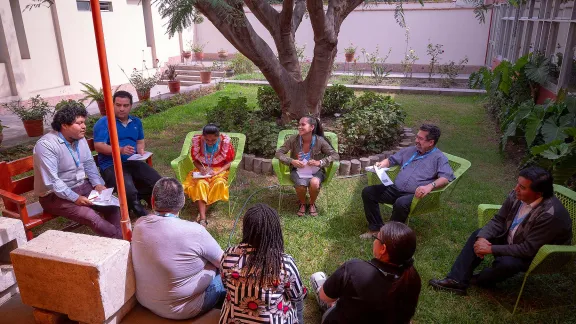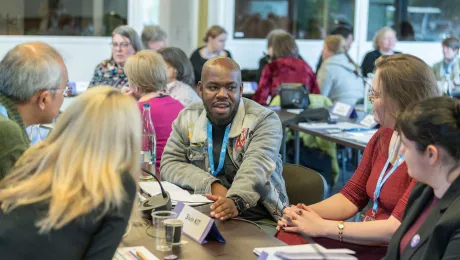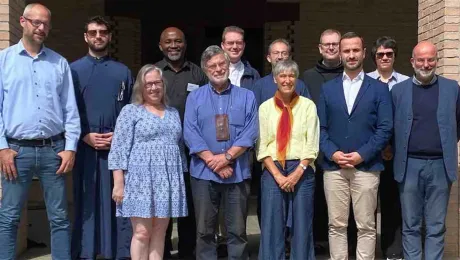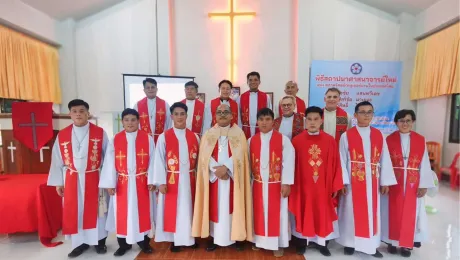
LWF regional and global gatherings provide space to reflect together on diverse contexts and identify common strategies and themes. In this photo; an intergenerational discussion at the 2019 Leadership Conference for the Latin America and Caribbean & North America regions, in Lima, Peru. LWF/A. Danielsson
LWF to launch study on shared theological heritage
(LWI) - The Lutheran World Federation (LWF) is launching a multi-year theological study on how spirituality forms Lutheran identities and church engagement around the world today.
The 2019-2022 process begins with a global consultation in Addis Ababa, Ethiopia, bringing together 70 representatives -- theologians and youth from LWF’s member churches in Africa, Asia, Europe, Latin America and the Caribbean and North America.
“We Believe in the Holy Spirit: Global Perspectives on Lutheran Identities” is the theme of the 23-27 October meeting hosted by The Ethiopian Evangelical Church Mekane Yesus (EECMY). LWF study processes provide an opportunity for a shared theological approach to identifying and addressing contemporary issues that the member churches face.
Participants will engage case studies, short papers and keynote presentations about the ways in which Lutheran identities are formed and informed by faith, tradition and diverse contexts.
The Zimbabwe Council of Churches General Secretary Rev. Dr Kenneth Mtata will focus on the Holy Spirit as a gift and promise. In her paper, Prof. Jennifer Wasmuth, director of the Institute for Ecumenical Research in Strasbourg, France, will discuss the Holy Spirit in God’s word and baptism, and Prof Veli-Matti Kärkkäinen, University of Helsinki, Finland, and Fuller Theological Seminary, California, United States, will speak about the vocation of the priesthood of all believers. Guest speakers from other Christian traditions will provide ecumenical perspectives. Among the many short paper presenters will be five young leaders and theologians who will highlight the experience of Lutheran youth within the LWF.
Rev. Dr Chad Rimmer, Program Executive for Lutheran Theology and Practice, who coordinates the LWF program, says the consultation is an opportunity for the global communion to expand the vision of what it means to be Lutheran in the world today. It also offers space to “deepen appreciation for the ways our shared faith liberates and equips us for life and service in the church, society and the public space.”
We want to explore that wonderful diversity, while celebrating a common faith that equips us for creative and transformational witness in the world.
There are different cultures and challenges that form churches in Australia, Brazil, Canada, Norway, Senegal or any other country, Rimmer continues. “To identify as a Lutheran is to make a faith claim that we are liberated to imagine justice and peace, and to answer God’s call to work for a reconciled creation. We want to explore that wonderful diversity, while celebrating a common faith that equips us for creative and transformational witness in the world,” he adds.
Worship and spirituality play a critical role in forming LWF’s self-understanding as a communion of Lutheran churches. Therefore, the consultation will be rooted in the context of daily prayers and Bible study. On Sunday, delegates will attend worship in different EECMY parishes around Addis Ababa.
Outcomes from the three-year process will contribute to the content of the Thirteenth Assembly of the LWF in 2023 in Poland.
“We Believe in the Holy Spirit: Global Perspectives on Lutheran Identities” takes place from 23 to 27 October in Addis Ababa, Ethiopia. The meeting is hosted by The Ethiopian Evangelical Church Mekane Yesus (EECMY). LWF study processes provide an opportunity for a shared theological approach to identifying and addressing contemporary issues that the member churches face.


